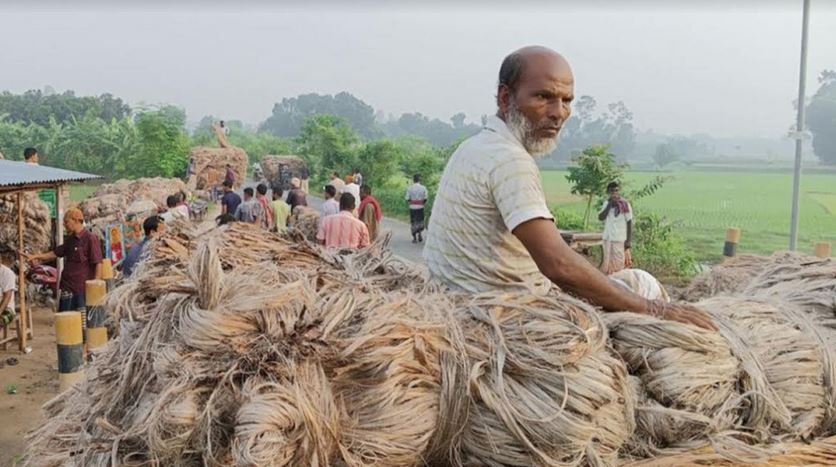
RAJSHAHI, Aug 2, 2024 (BSS) - Farmers are happy as they are getting satisfactory yield and market price of jute everywhere in the region during the current season.
Bazler Rahman, 41, a farmer of Roipara village under Durgapur upazila, has sold his jute at Taka 2,550 per mound, saying the return has mitigated all his sufferings and financial crises faced before the selling.
Rahman said many of the enthusiastic farmers were seen humming towards the Durgapur and Taherpur markets with dry jute riding on trolleys and human haulers.
He, however, said the jute fiber is being sold at Taka 2,300 to 2,850 mounds during the last couple of days.
Rafiqul Islam, 45, a resident of Devipur village of the upazila, has harvested around 12 mounds of jute fiber from two bighas of land.
In the initial stage, he sold his products at Taka 2,800 per mound in local markets, saying the current price is higher compared to the previous seasons.
Apart from this, he got jute sticks worth around Taka 6,000 from the farming.
Like them, many other farmers expressed their happiness over the expected yield and price.
Meanwhile, harvesting of jute is progressing fast everywhere in all eight districts under Rajshahi division in the current season with a prediction of better yield amid the present favorable climatic condition.
Currently, most of the growers along with their family members are very much engaged in harvesting, decomposing, segregating and transporting for selling of jute, generating seasonal job opportunities for many people, including the marginalized and ethnic minorities.
Officials and farmers are very much hopeful about harvesting better jute yield in the country's northwest region this season.
Farmers are very much interested in jute farming as they are getting lucrative prices for its produce during the last couple of years giving a message of getting back to the golden era of the cash crop in the near future.
Abdur Razzaque, a farmer of Shreepur village under Paba upazila, said jute's golden era has started returning back.
He said the role of private jute mills and the government's declaration about the mandatory use of jute bags in packaging public food grains boosted jute cultivation.
Mahmudul Faruque, Additional Director of Department of Agricultural Extension (DAE), said jute farming has started getting a brighter dimension through increasing its production and adopting other effective measures.
The farmers have started adopting the latest line sowing jute technology using seeders machines saving huge seeds and reducing farming costs and ribbon-retting method to get quality fiber and more profit.
Faruque said necessary measures are being taken for making the farmers habituated to promoting high-yielding jute varieties for boosting its production.
Export prospects of jute and its goods produced in the region is very bright as its production side by side with the demand of jute and jute goods has gradually been rising for the last couple of years.
Kazi Saidur Rahman, Assistant Director of Export Promotion of Bangladesh (EPB), here said lion portions of jute produced in the country's northwest region are being exported to different countries.
He said there are enormous prospects of exporting jute and jute goods from the region. To this end, increasing the number of new entrepreneurs in this field is needed.
Emphasis should be given on encouraging the foreign buyers to invest here.
Apart from this, existing problems should be solved with special initiatives for exploring the door of prospects.
Rahman also said they are working to export jute and jute goods in tax-free manner to the countries under the SAARC Preferential Trading Arrangement (SAPTA).
Masudur Rahman, President of Rajshahi Chamber of Commerce and Industries, said Indian businessmen import jute from the region and export jute goods to many other foreign countries after processing.
He opined that businessmen of the region can't catch foreign buyers due to various reasons, including language complexities, and the Indian businessmen are taking advantage of the situation.
Side by side with the Indian buyers, if the local businessmen can catch buyers of other countries a new door will open up in the field of jute export from the region.